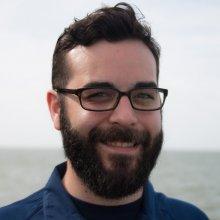
Dennis (DJ) Pevey
Tell us about your work / research. What kinds of things do you do?
I teach biology, programming, and engineering courses at Ponchatoula High School in South Louisiana. I’m passionate about expanding access to high-quality STEM experiences to all students. I believe that students who regularly engage in STEM activities in the classroom are far more likely to pursue careers in technology, science and engineering in the future. I therefore seek to develop student projects that highlight the application of STEM to address problems in our local community. My students have built underwater robots to survey for pollutants in local waterways, partnered with city planners to explore elements of sustainable design in urban settings, and even experimented with artificial intelligence to develop tools to help people with disabilities.
What sparked your initial interest in your career?
From kindergarten to college, I have been fortunate enough to have been taught by some amazing educators. These men and women showed me how to find the wonder in the world around me and challenged me to make a difference in the world. Unfortunately, many students across the country do not have access to a great education. My goal is to make an impact in the lives of young people and inspire the next generation of inventors, tinkerers, and innovators.
Who influenced you or encouraged you the most?
My 3rd grade teacher, Mrs Bass was the first person to recognize a talent for music and drama and nurture it into one of my life's greatest passions. Through her influence and the influence of teachers after her, I found my way into education. I hope that one day, I can make a difference in one of my student's life in the same way as she did for me.
What element of your work / study do you think is the most fascinating?
Its completely mind-boggling to think that I am a part of a team of people working as a single body to use robots to explore the bottom of the ocean. Working aboard the Nautilus is the most amazing experience I've ever had!
What other jobs led you to your current career?
Outside the classroom, I work with private and governmental agencies including the US Green Building Council, Louisiana Department of Education, and Harvard University’s K-12 learning tool, LabXchange, to develop and review digital STEM curriculum intended for international audiences. I’ve also served as a trainer and guest clinician for many school districts across the southeastern United States.
What are your degrees and certifications?
BA in Education- Centenary College of Louisiana 2010
What are your hobbies?
I love a good book...a tough puzzle...and a big cup of coffee.
What advice would you give to someone who wants to have a career like yours?
Never grow up! In order to get into the mind of a child, you have to be able to get on their level. Be inspired by the natural world. When you make a Lisa's jaw drop in wonder, their minds are open and ready to learn. Finally, be passionate. When you love what you do, you can't help but be successfull and inspire others around you.
How did you get involved in the Nautilus Exploration Program? How did you get on the ship?
I joined the Corps of Exploration in 2015 when I served as a Science Communication Fellow and participated on the GISR (Gulf Integrated Spill Response) cruise investigating methane seeps in the Gulf of Mexico. I returned to Nautilus during the 2016 and 2017 expedition seasons as we explored and mapped different National Marine Sanctuaries along the US Pacific Coast. I’m excited to be back on the ship for the 2024 Expedition Season and connecting with new people and communities around the globe!
"Exploration of the unknown is a core tenet of science. Sailing aboard the Nautilus will offer me and my students the chance to connect with a rich heritage of scientific explorers such as Charles Darwin, Alfred Wegener, and others that have contributed so much to the body of science."
Expeditions
Dennis (DJ) participated in the following Ocean Exploration Trust expeditions:
